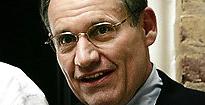Max Boot: Woodward Offers "No Analysis"
 Max Boot writes:
Max Boot writes:
'Obama's Wars," Bob Woodward's latest epic of insiderdom, quotes National Security Adviser James Jones telling his deputy, Tom Donilon, that he had made a mistake—"he had never gone to Afghanistan or Iraq, or really left the office for a serious field trip. As a result, he said, you have no direct understanding of those places. . . . The White House, Situation Room, interagency byplay, as important as they are, are not everything." Good advice. Too bad Mr. Woodward hasn't followed it himself.
While chronicling the Obama administration's Afghanistan policy, Mr. Woodward apparently visited Afghanistan only once, traveling with Mr. Jones. His description of the trip is inadvertently hilarious and revealing. He recounts flying "into the heart of the Taliban insurgency in Helmand province." Here, he proclaims, "was the war without the filter of a Situation Room briefing. The cool evening air hit my face as the plane's rear loading ramp was lowered. . . . All that was missing was the haunting and elegiac theme music from Oliver Stone's movie Platoon." The experience, he continues, is "exhilarating and frightening." The camp is "supposedly safe from sniper and mortar fire," but when he makes a midnight head call, he is decidedly nervous, "anticipating a random shot."
You would think that Battlefield Bob had bivouacked in a foxhole a few hundred yards from an enemy position. Actually he is in Camp Leatherneck, a giant Marine base (1,500 acres housing 10,000 personnel) in the middle of nowhere. The greatest danger at Leatherneck is overeating in the chow hall. That Mr. Woodward makes it seem like a frontline position is indicative of how far removed he is from the war.
To read "Obama's Wars" is to feel trapped in a daylong meeting in an airless room. That's because much of the book consists of a near- verbatim account of meetings—specifically the National Security Council meetings last fall where the administration hashed out its Afghanistan policy. As we know, the president ultimately decided to send 30,000 additional troops while pledging to start pulling them out in the summer of 2011.
This decision was a compromise between Gen. Stanley McChrystal, who wanted 40,000 reinforcements to pursue a classic counterinsurgency strategy, and skeptics led by Vice President Joe Biden, who proposed a smaller troop figure (20,000) focused on a narrow mission of hunting down terrorists. The contours of the internal debate have long been known; what Mr. Woodward does is fill in details about who said what at which meeting.
He probably deserves credit for getting his hands on what appear to be minutes of those sessions—although by now one supposes that all such documents are routinely cc'd to this Washington institution, Mr. Behind-the-Scenes. As usual, the reader has to take on faith that his reporting is accurate, because the sourcing is so vague ("background interviews" with "firsthand sources"). Faith is strained when Mr. Woodward, like a novelist, tells us what various people were thinking ("McConnell worried that the temptation of covert action might entrance Obama"). But even assuming that his "revelations" are largely accurate, it is hard to know what they amount to.
Mr. Woodward tosses out facts seemingly at random, with no context or analysis. At one point he recounts a dinner conversation in a Georgetown restaurant between Gen. David Petraeus and Richard Holbrooke. Suddenly they are interrupted by White House reporter Helen Thomas, who demands, with her usual subtlety: "What the hell are you doing in Afghanistan? . . . This is Vietnam all over again." Gen. Petraeus tries to explain, but Ms. Thomas "didn't feel reassured." The book then moves on, leaving us to puzzle out why this encounter was included. Does Mr. Woodward transcribe everything in his notebook? Or are we supposed to be disquieted by the fact that Helen Thomas thinks Afghanistan is another Vietnam? No one familiar with her wacky views could possibly take anything she says seriously. Yet Mr. Woodward presents her opinion deadpan, as if she were a sage worth quoting.
Click here to read more.

